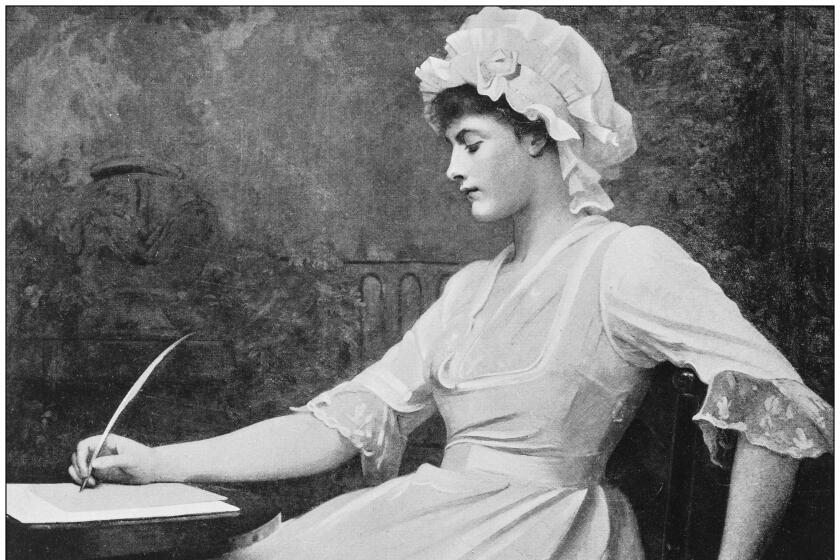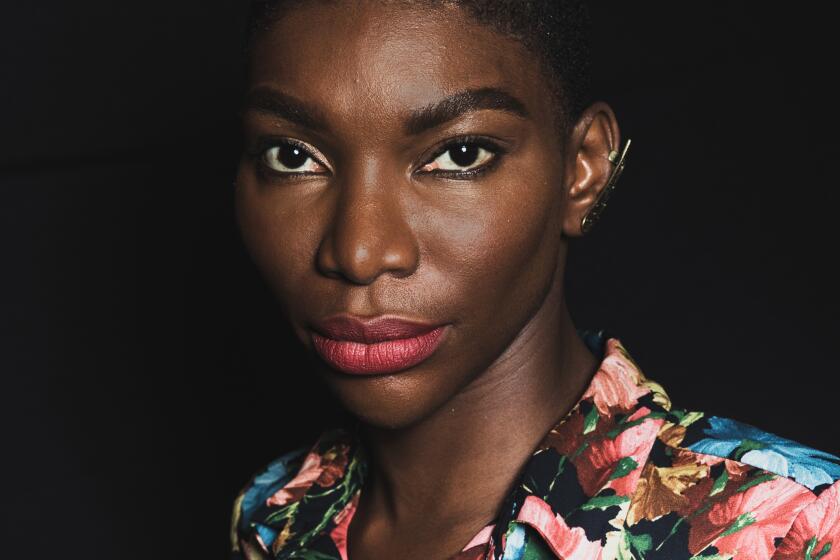Commentary: The fight for women’s rights is a story for the ages. Why isn’t it bigger on TV?
- Share via
The rise of Sen. Kamala Harris could be a made-for-TV drama. Joe Biden’s newly minted running mate, the child of Indian and Jamaican immigrants, is now poised to become the first woman and first person of color to hold the office of vice president.
The historic moment lands in tandem with the anniversary of another breakthrough for women in American politics: the right to vote. The largest expansion of voting rights in U.S. history happened 100 years ago this month, when the 19th Amendment was finally enshrined in the Constitution.
The dramatic fight to cast a ballot of one’s own is a slice of history packed with the sorts of heroes, vigilantes and avengers that TV loves to resurrect and reinterpret for prime-time, prestige viewing. And what better time than a centennial anniversary to recall the best of cable’s action-packed dramas featuring Elizabeth Cady Stanton and Lucretia Mott, network classics depicting the fierce Susan B. Anthony, or streaming’s irreverent suffragist superhero shows starring half of Hollywood as Alice Paul, Ida B. Wells, Mary Church Terrell and Mabel Ping-Hua Lee.
If only they existed.
“Mrs. America” depicts the battle over the Equal Rights Amendment in the 1970s. We’re fact-checking its historical accuracy, episode by episode.
One hundred years and one Kamala Harris later, there are still very few TV series about first- (or second-) wave feminism in the vault. You can count on one fist in the air the number of major network series about suffrage. Throw in those about subsequent milestones in the fight for women’s rights and you’d be hard-pressed to put on a 24-hour marathon about the battles and victories that irrevocably changed our lives, the lives of our ancestors and the destiny of our daughters.
Documentary series are the exception, of course. PBS has dedicated the summer to a slate of multiplatform content “honoring U.S. women’s suffrage, the feminist movement and modern-day change makers.” The lineup includes “American Experience’s” “The Vote,” which chronicles the campaign waged by American women for the right to vote; “And She Could Be Next,” a “POV” miniseries following women of color candidates and activists during the 2018 midterms; and a host of other, previously released docs about remarkable women such as Toni Morrison.
Pop culture’s most recognizable suffragist is still the flighty Mrs. Winifred Banks, as played by Glynis Johns in the 1964 Disney classic “Mary Poppins.” Her participation in women’s marches and protests is a well-heeled hobby, and her silly feminist streak has rendered her a neglectful mother who needs a nanny to raise her kids. Thank goodness for Mary.
So: Thanks to the rare television titles that tackle the fight for voting rights head-on. They include BBC’s 1974 “Shoulder to Shoulder” and HBO’s 2004 “Iron Jawed Angels,” and “Timeless,” “Downton Abbey” and “Boardwalk Empire” each featured characters and an episode or two with suffrage as a backdrop. And, of course, there’s “Schoolhouse Rock’s” 1976 classic, “Sufferin’ Till Suffrage”: “Susan B. Anthony (yeah!) and Julia Howe, Lucretia Mott (and others!), they showed us how. They carried signs and marched in lines. Until at long last the law was passed.”
The latter lesson was tucked inside a marketing effort to sell more Lucky Charms, but at least it was highlighting a chapter of history that other gatekeepers have mostly chosen to ignore. A handful of other productions over the years are worth rewatching too, such as “Bletchley Circle,” following Britain’s female codebreakers after World War II; Amazon Prime’s “Good Girls Revolt,” about pioneering female journalists at an American newsmagazine at the end of the 1960s; and AMC’s “Halt and Catch Fire,” which uses one of TV’s most indelible partnerships to explore the role of women in early tech. It’s hardly possible to produce a comprehensive picture of women’s history by connecting these dots, though — particularly if that history is to include women of color and global movements for rights.
Novelist Lynn Steger Strong on the revolutionary passivity of Rachel Cusk, Ottessa Moshfegh and Sally Rooney — how we’ve misread them and what comes next.
But an interesting thing happened on the detour around herstory and the industry’s long-standing fear of women who march and demand things other than sex from a male lead. Female creators and producers are telling those tales from myriad angles, and increasingly on their own terms.
“Dickinson” showrunner Alena Smith is behind the award-winning Apple TV+ dramedy about the 19th century poet Emily Dickinson. “History is power, and the way we tell it is a form of how power is wielded,” Smith says. “What we are really doing is reclaiming and restaging history. We have to retell the narrative of who we are and how we got here. We have to put ourselves at the center of it. We’re making a story that’s relevant to us.”
The series, which premiered last year, opens up the stuffy parlor and imbues the writer and her female companions with some present-day freedoms, such as cursing and twerking. “With Dickinson we give [them] consciousness of a contemporary young woman, but they live in a reality where they’re not allowed to vote or own property,” says Smith, whose series has already been renewed for a second season. “That’s part of the whole experiment: We show that they weren’t any different from us but they lived under these brutally different circumstances. Whereas if you just had everybody talking in quaint period language, that point would not be driven home as effectively.”
“Dickinson” is part of a nascent wave of current or recent TV programs beginning to dig deeper into women’s fights for equality, reproductive rights and racial justice, though the long arc of those political movements is often reflected in fictional-future dramas such as Hulu’s “The Handmaid’s Tale” or biographies like Netflix’s “Self Made: Inspired by the Life of Madam C.J. Walker.” In other series like “Better Things,” “Fleabag,” “P-Valley,” “Vida” and “I May Destroy You,” female writers, directors and stars have placed contemporary women’s lives front and center — and at the forefront of the art form — even if their subject matter is not “political” in the electoral sense.
Michaela Coel, creator, writer, star and co-director of HBO’s “I May Destroy You,” talks about channeling her personal trauma into the acclaimed HBO series.
FX’s recent “Mrs. America” is one of the few productions that dares to set its story at a critical juncture in modern feminism. The 1970s-era drama, starring Cate Blanchett, chronicles the failure of the Equal Rights Amendment, another major upheaval for American women that’s barely been represented onscreen, let alone in public school history books. The popular series exposed the rigors of tackling a movement that TV has generally left to late-night comedians.
Even that Emmy-nominated limited series has elicited criticism for not telling the whole story: In a guest column for The Times, Eleanor Smeal and Gloria Steinem (the latter portrayed in the series by Rose Byrne) lamented the inaccuracy of the TV adaptation of their efforts to ratify the ERA. “‘Mrs. America’ has described deck chairs on the Titanic but lied about why the Titanic went down,” they wrote. “Instead, it has given us the Catfight Theory of History.”
But as “Dickinson’s” Smith suggests, getting to the point of being criticized by feminist icons requires getting it made in the first place — and for too long the subject of women’s history in pop culture has been overlooked, neglected or rejected by men.
“The reason why you couldn’t [successfully] pitch a suffragette story to Les Moonves is because he actively didn’t want to hear it,” Smith surmises, referring to the former chairman and CEO of CBS Corp., who resigned in 2018 after numerous allegations of sexual misconduct. “He actively didn’t see himself in it. And so that history gets suppressed. But a story that’s as dramatic, and matters as much, as women getting the right to vote? The fact that it has not been told a million times would indicate that somebody was not interested in hearing the story. That’s why we need better representation and diversity in the ranks of executives and people who make these decisions. People who greenlight. Women.”
More to Read
The complete guide to home viewing
Get Screen Gab for everything about the TV shows and streaming movies everyone’s talking about.
You may occasionally receive promotional content from the Los Angeles Times.









